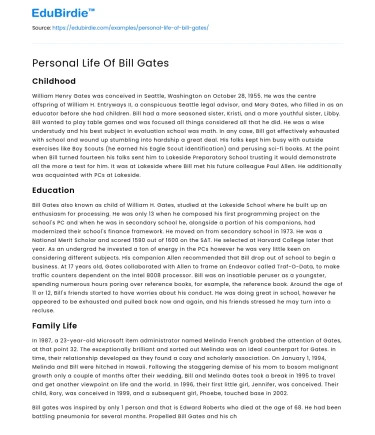Introduction
Bill Gates is a name synonymous with personal computing and philanthropy, largely due to his pivotal role in founding Microsoft and his subsequent charitable endeavors through the Bill & Melinda Gates Foundation. However, beneath the public persona lies a multifaceted personal life that has shaped his professional achievements. Understanding Gates' personal life provides essential insights into the motivations and values that have driven his career and philanthropic work. This essay aims to explore the various dimensions of Gates' personal life, including his upbringing, family relationships, and philanthropic ethos. By examining these elements, we can gain a more comprehensive understanding of the man behind the public image and appreciate the complexities that define his personal journey.
Early Life and Education
William Henry Gates III was born on October 28, 1955, in Seattle, Washington, into a family that valued education and hard work. His father, William H. Gates Sr., was a prominent lawyer, while his mother, Mary Maxwell Gates, served on several corporate boards, including that of the United Way. This environment cultivated a strong foundation for Gates, fostering an early interest in computers and technology. Gates attended the Lakeside School, where his passion for programming was ignited. It was here that he met Paul Allen, who would later become his collaborator in founding Microsoft. Gates' early exposure to computers was furthered by his enrollment at Harvard University, where he pursued a pre-law degree. However, his obsession with programming led him to drop out in 1975 to focus on Microsoft full-time.
Save your time!
We can take care of your essay
- Proper editing and formatting
- Free revision, title page, and bibliography
- Flexible prices and money-back guarantee
Gates' education played a crucial role in shaping his personal and professional trajectory. The skills and networks he developed during his formative years at Lakeside and Harvard were instrumental in his success at Microsoft. However, Gates' decision to leave Harvard reflects a willingness to take risks, a trait that has characterized much of his career. Critics might argue that Gates' privileged background afforded him opportunities and safety nets unavailable to others. While this is undoubtedly true, Gates' early life underscores the importance of seizing opportunities and pursuing one's passions, lessons that have applications beyond his personal narrative.
Family Life and Relationships
Bill Gates' personal life is also defined by his family relationships, which have significantly influenced his values and priorities. In 1994, Gates married Melinda French, a former Microsoft manager, in a private ceremony in Hawaii. Together, they have three children: Jennifer, Rory, and Phoebe. The Gates family has often been characterized as private, with Gates and Melinda emphasizing the importance of providing a normal upbringing for their children despite their vast wealth. They have been vocal about their desire to instill a strong work ethic in their children, with Gates famously stating that his children would not inherit the bulk of his fortune.
Gates' relationship with Melinda has been a cornerstone of his personal and philanthropic life. The couple's shared commitment to philanthropy led to the establishment of the Bill & Melinda Gates Foundation, which has become one of the largest private foundations in the world. However, in May 2021, the couple announced their decision to divorce after 27 years of marriage, citing irreconcilable differences. The divorce, while a personal matter, has implications for the Gates Foundation and its future endeavors. Despite their separation, Gates and Melinda have pledged to continue their collaborative work in philanthropy, underscoring their shared commitment to addressing global challenges.
Philanthropy and Legacy
Philanthropy is a defining aspect of Bill Gates' personal life, reflecting his belief in the transformative power of wealth for social good. The Bill & Melinda Gates Foundation, established in 2000, has been at the forefront of initiatives aimed at improving global health, reducing poverty, and expanding educational opportunities. The foundation's work has been guided by Gates' conviction that all lives have equal value, a principle rooted in his personal experiences and family values. Gates' philanthropic efforts have not been without criticism. Some argue that the concentration of such significant wealth in a single foundation poses risks, including a lack of accountability and influence over public policy.
Despite these critiques, Gates' philanthropy has had a profound impact on global health and development. The foundation's investments in vaccine development and education have saved countless lives and improved living conditions for millions around the world. Gates' personal commitment to philanthropy is further evidenced by his involvement in the Giving Pledge, a commitment by the world's wealthiest individuals to dedicate the majority of their wealth to charitable causes. This pledge highlights Gates' belief in the responsibility of the affluent to contribute to societal well-being, a philosophy that continues to shape his personal and professional legacy.
Conclusion
Bill Gates' personal life is a tapestry woven with threads of familial influence, educational opportunities, and a deep commitment to philanthropy. His upbringing and early exposure to technology set the stage for his professional achievements, while his family relationships and marriage to Melinda have significantly influenced his values and priorities. Gates' philanthropic endeavors reflect his belief in using wealth to effect positive change, a legacy that will undoubtedly endure beyond his lifetime. While his privileged background and substantial resources have played a role in his success, Gates' personal life underscores the importance of leveraging one's opportunities for the greater good. As Gates continues to navigate the complexities of his personal and professional life, his story serves as a testament to the impact of individual choices and the enduring power of philanthropy.






 Stuck on your essay?
Stuck on your essay?

